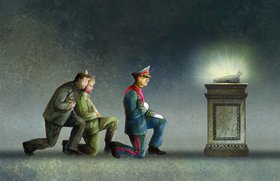When democracies make nice with dictators, the world’s worst regimes get away with murder.
 Illustration by Nenad Jakesevic for FP
Illustration by Nenad Jakesevic for FP
The civilized world is in peril. Hezbollah, Iran,
and North Korea continue to exist with minimal accountability for the
danger they pose. Terrorists and dictators are welcomed to the arena of
polite diplomacy, despite their total contempt, even hatred, for what
Western civilization represents. Engagement and appeasement are failing
as they always have. Today, a new framework is required to replace the
old structures and agreements that dictate global diplomacy. I do not
refer to reforming the United Nations. It is now so outdated that
suggestions to reform it are themselves past their time. The United
Nations was formed to freeze a crisis—the Cold War—not to solve crises.
Our war today is a hot one, and it is not about territory, ideology, or
commerce. It is about the value of human life. The world needs a new
organization based on a global Magna Carta, a declaration of
inalienable human rights that all member nations must recognize.
Without guiding standards, we are being dragged down to the lowest
common denominator. Communism was defeated not by moral relativism and
long meetings but by an opposition possessing firm and unabashed moral
leadership, combined with the increasing superiority of the West’s
technology and standard of living.
My matches against generations of chess computers made it painfully
clear to me that the march of technology cannot be stopped. The lucky
moment we have inhabited, in which weapons of mass destruction (WMD)
are prohibitively expensive and difficult to manufacture, is rapidly
coming to an end. There is no single solution to prevent the
proliferation of terror and WMD, but we must take the first step and
recognize that no solution is possible with our current mechanisms.
Right now, nations that talk democracy make dirty little secret deals
with strategic allies who have no use for democratic values. These
double standards must end. A united front of strict and strategic
sanctions and aid packages is necessary for carrot-stick incentives to
work. United military intervention to protect human lives must also be
kept on the table. The values enshrined in a new Magna Carta must be
defended as if they were borders, for that is exactly what they are.
Nations that value democracy and human life now control the greater
part of the world’s resources as well as its military power. If they
band together and refuse to coddle the rogue regimes and sponsors of
terror, their authority will be irresistible. Their combined wealth can
fund new technologies to cure their oil addiction, which currently
empowers a preponderance of terrorists and dictators.
The goal with such a compact is not to build walls to isolate the
millions of people living under authoritarian rule. Instead, it is to
provide real leadership by example as well as concrete incentives to
respect human rights. Look at the speed with which the incentive of
joining the European Union has spurred dramatic reforms throughout
Eastern Europe. This model should be replicated on a global scale.
In his famous 1946 speech in Fulton, Missouri, Winston Churchill warned
that the newly established United Nations must be “a force for action,
and not merely a frothing of words.” We can see today that his warnings
went unheeded. The so-called leaders of the free world talk about
promoting democracy while treating the leaders of the world’s most
autocratic regimes as equals. A global Magna Carta would forbid this
hypocrisy and provide a powerful inducement for reform. The policies of
engagement have failed on every level in every quarter of the world. It
is well past time to recognize this failure and to try a new path.
 Search
Search FP Archive
FP Archive Article Index
Article Index FP e-Alert
FP e-Alert Breaking Global News
Breaking Global News Worldwide Links
Worldwide Links Special Reports
Special Reports Idea Feed
Idea Feed Country Intelligence
Country Intelligence Search
Search FP Archive
FP Archive Article Index
Article Index FP e-Alert
FP e-Alert Breaking Global News
Breaking Global News Worldwide Links
Worldwide Links Special Reports
Special Reports Idea Feed
Idea Feed Country Intelligence
Country Intelligence Meet the Staff
Meet the Staff Foreign Editions
Foreign Editions Reprint Permissions
Reprint Permissions Academic Program
Academic Program Advertising
Advertising Corporate Programs
Corporate Programs Writers' Guidelines
Writers' Guidelines Press Room
Press Room FP in the News
FP in the News Work at FP
Work at FP Contact Us
Contact Us Subscription Services
Subscription Services Academic Program
Academic Program FP e-Alert
FP e-Alert FP Archive
FP Archive Reprint Permissions
Reprint Permissions FP Reports & Merchandise
FP Reports & Merchandise Buy Back Issues
Buy Back Issues Contact Us
Contact Us New
New Renew
Renew Gift
Gift Academic
Academic

